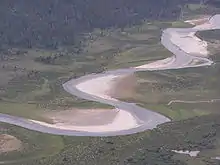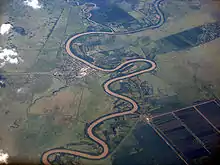meander
English
Alternative forms
- mæander (archaic)
Etymology
From Latin Maeander, from Ancient Greek Μαίανδρος (Maíandros) – a river in Asia Minor (present day Turkey) known for its winding course (modern Turkish Menderes).
Noun
meander (plural meanders)
- (often plural) One of the turns of a winding, crooked, or involved course.
- the meanders of an old river, or of the veins and arteries in the body
- (geography) One of a series of regular sinuous curves, bends, loops, turns, or windings in the channel of a river, stream, or other watercourse
- 1712, Sir Richard Blackmore, Creation: A Philosophical Poem:
- See, how the streams advancing to the main, / Through crooked channels draw their crystal train! / While lingering thus they in meanders glide, / They scatter verdant life on either side.
-
- A tortuous or winding journey.
- 2014 August 1, Enders A. Robinson; Dean Clark, Remote Sensing in Action: The Curious Case of Sherlock Holmes and Albert Einstein, SEG Books, →ISBN, page 30:
- That journey in the spring of 1891 tracked historical underpinnings of the edifice that Einstein built. Our story will be an extremely interesting mental meander to trace the evolution some of the aspects of relativity theory from the beginning.
-
- (Can we verify(+) this sense?) Perplexity.
- Synonym of Greek key, a decorative border; fretwork.
- 1912, Field Museum of Natural History, Anthropological Series, page 227:
- The scales are conceived of as meander fretwork; but I do not know whether, for this reason, this fish is associated with thunder.
- 2008, Todd Merrill, James Mont: The King Cole Penthouse, Lulu.com, →ISBN:
- A chair rail adorned with Chinese fretwork molding was a specific meander that repeated throughout the home. Moldings shaped as cartouches lined each wall, […]
-
- (mathematics) A self-avoiding closed curve which intersects a line a number of times.
- (possibly obsolete) A path on which the directions, distances, and elevations are noted, as a part of a land survey.
- 1894, United States Bureau of Land Management, Manual of Surveying Instructions for the Survey of the Public Lands of the United States and Private Land Claims, page 44:
- Markings on Meander Corners. On all meander corners, the letters “M. C.” ( for meander corner) will be cut into the side facing the stream or lake to be meandered. On post or tree meander corners, within township exteriors […]
- 1911, United States House Committee on Public Lands, Providing for Appeals from Decisions of the Interior Department in Land Matters: Hearing Held Before the Committee on the Public Lands of the House Representatives, June 22, 1910, on H.R. 27071, "To Provide for Appeals from Decisions of the Secretary of the Interior to the Court of Appeals of the District of Columbia, and for Other Purposes.", page 56:
- And as to the lands that were within the national meander boundaries, that description was based upon a state survey?
-
Derived terms
- meander belt
- meanderer
- meanderian
- meanderic
- meanderiform
- meanderine
- meandering
- meander line
- meander loop
- meandrous
- meandry
Translations
|
|
- The translations below need to be checked and inserted above into the appropriate translation tables. See instructions at Wiktionary:Entry layout § Translations.
Verb
meander (third-person singular simple present meanders, present participle meandering, simple past and past participle meandered)
- (intransitive) To wind or turn in a course or passage; to be intricate.
- The stream meandered through the valley.
- 2020 November 18, Paul Bigland, “New infrastructure and new rolling stock”, in Rail, page 51:
- I'd forgotten how scenic parts of the line are - the railway crosses a host of streams while meandering through meadows or skirting woodland.
- (transitive) To wind, turn, or twist; to make flexuous.
- 1612, Michael Drayton, “(please specify the chapter)”, in [John Selden], editor, Poly-Olbion. Or A Chorographicall Description of Tracts, Riuers, Mountaines, Forests, and Other Parts of this Renowned Isle of Great Britaine, […], London: […] H[umphrey] L[ownes] for Mathew Lownes; I. Browne; I. Helme; I. Busbie, published 1613, →OCLC:
- Her labyrinth-like ţurns, and mad meander'd trace […]
-
Translations
|
|
- The translations below need to be checked and inserted above into the appropriate translation tables. See instructions at Wiktionary:Entry layout § Translations.
|
References
- The Chambers Dictionary (1998)
- “meander”, in The Century Dictionary […], New York, N.Y.: The Century Co., 1911, →OCLC.
Further reading
 meander on Wikipedia.Wikipedia
meander on Wikipedia.Wikipedia  Büyük Menderes River on Wikipedia.Wikipedia
Büyük Menderes River on Wikipedia.Wikipedia
Norwegian Bokmål

Etymology
From Latin Maeander, from Ancient Greek Μαίανδρος (Maíandros).
Noun
meander m (definite singular meanderen, indefinite plural meandere or meandre or meandrer, definite plural meanderne or meandrene)
- a meander (in a river)
Derived terms
Norwegian Nynorsk
Etymology
From Latin Maeander, from Ancient Greek Μαίανδρος (Maíandros).
Noun
meander m (definite singular meanderen, indefinite plural meandrar, definite plural meandrane)
- a meander (in a river)
Derived terms
References
- “meander” in The Nynorsk Dictionary.
Polish

An aerial photograph of meanders of the Río Cauto
.jpg.webp)
A meander on the floor of a tepidarium
Etymology
Borrowed from German Mäander, from Latin Maeander, from Ancient Greek Μαίανδρος (Maíandros) – a river in Asia Minor (present day Turkey) known for its winding course.
Pronunciation
- IPA(key): /mɛˈan.dɛr/
Audio (file) - Rhymes: -andɛr
- Syllabification: me‧an‧der
Noun
meander m inan